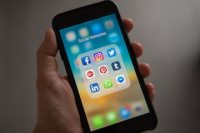 We all know that the internet is a two-sided beast: it’s just fabulous to be able to connect with people all around the world, to uncover news and information that might otherwise be difficult or even impossible to access, to make unexpected friends and find new clients…
We all know that the internet is a two-sided beast: it’s just fabulous to be able to connect with people all around the world, to uncover news and information that might otherwise be difficult or even impossible to access, to make unexpected friends and find new clients…
AND it’s an overwhelming pressure to stay up with all the e-information, to not be constantly comparing our lives with the golden lives of others (or at least, the golden bits they share), to resist nasty comments if we’re the subject of cyber-bullying, to not get sucked into buying everything we don’t need because of the exciting offers that land in our inbox, etc. etc. And I’m just scratching the surface of the pros and cons!
The darker side of Facebook loomed closer as we began to recognise those pressures and learnt about privacy and security leaks and other significant issues. The Boomers among us, for example, are concerned that our young people are growing up in an exceedingly public era where everything they think and feel and do is announced to the world, whether their big successes and failures, or what they ate for breakfast.
So what could be the silver lining on that constant public exposure?
 Here’s one possibility: What if it’s to prepare them (us) for leadership?
Here’s one possibility: What if it’s to prepare them (us) for leadership?
I remember doing a personal development course many years ago in which most of the participants were aspiring leaders of one sort or another. We were presented with the question: Are you prepared, in becoming a leader, to have all your thoughts and behaviours scrutinised by the world 24/7?
They say that the true sign of character is who you are when no one is watching; living by that principle will call out the best in us for sure, but being watched is just as compelling a factor, and as a leader someone is always watching, so the pressure to ‘live your best character’ at all times becomes acute when we step into a leadership role.
The more famous we are, the more immortal our words because everyone is watching, listening, recording. We’re not anonymous anymore. And while most of us will never achieve true fame, at another level we are all famous these days. We all have ‘followers’. We all have at least some people we don’t know very well who are observing us. A very real practical application of this dynamic is that potential employers check our social media pages.
So maybe the hidden purpose of Facebook (et al) is to give each of us the opportunity to be a leader. Maybe the ‘fame’ (i.e. public exposure) that we achieve on these pages provides the experience leaders have when everything they say and do is in the spotlight.
Some leaders clearly don’t care what others think of them, or they have such different values and standards that we are gob-smacked by their behaviour. (You know who I mean.) But what if we used the ‘fact of our fame’ to pause for a moment, to create a gap (as mentioned in Quest For Riches regarding expenditure), to reflect on who we’re being and to consciously choose who we want to be and how we want to be.
In that case, our ‘Facebook fame’ might serve us.
Let me know your thoughts – comment below!
Meanwhile, The Hidden Order is still on special at half-price – this juicy book looks beneath the covers. Rather than reacting to how life appears on the surface, it explores the deeper universal laws and principles affecting all of us. Just use code HIDDENORDER when you place your order.
Social media image by Tracy Le Blanc, Obama pic by Daniel McDonald, both via Pexels.


Recent Comments